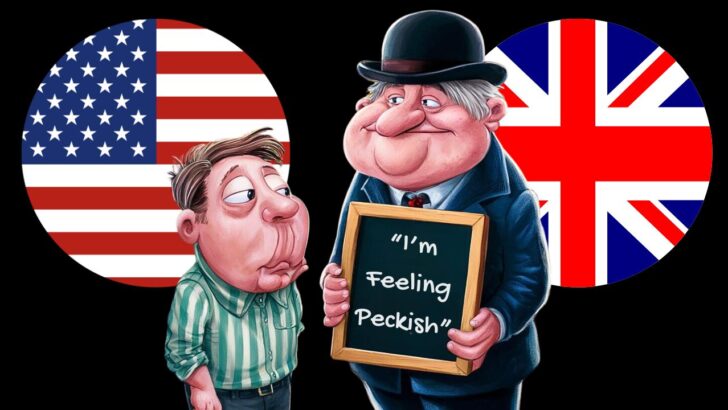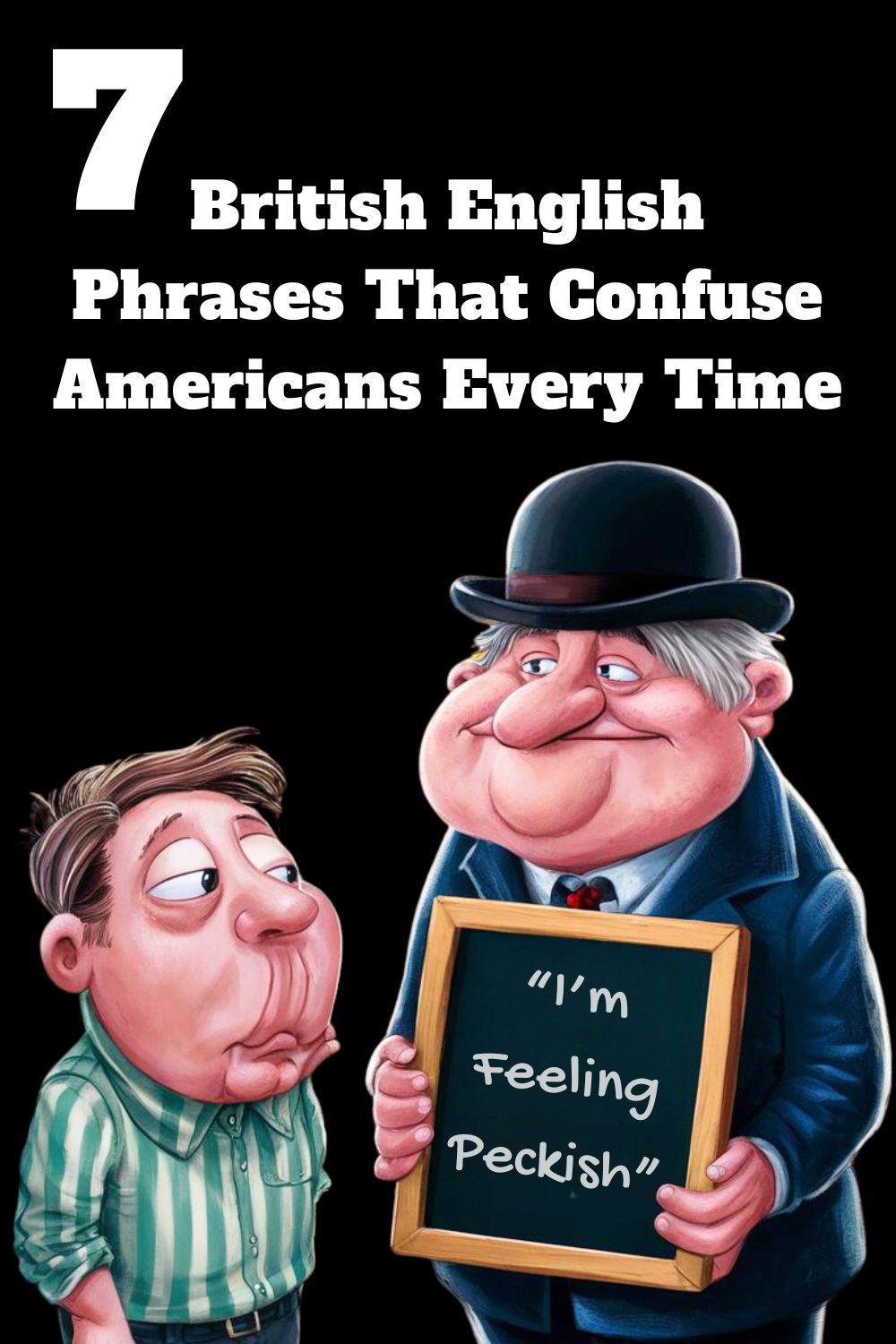Have you ever been in the middle of a conversation with a Brit and suddenly felt like you’ve been dropped into a parallel universe? One minute, you’re nodding along; the next, you’re questioning if English is even your first language. British English is full of funny phrases that sound completely normal to those across the pond but confuse others. These phrases are the kind that, when you first hear them, make you wonder if you accidentally tuned into a Monty Python sketch.
But fear not! We’re here to decode the mystery behind these bewildering expressions and have a bit of fun along the way. Ready to find out what on earth they’re actually talking about? Let’s find out!
1. “I’m Chuffed to Bits”
When a Brit tells you they’re “chuffed to bits,” you might initially picture something along the lines of a machine breaking down or an unfortunate kitchen mishap involving a blender. But fear not—this phrase is actually a sign that something wonderful has happened! In British English, “chuffed” means someone feels extremely pleased or proud, while “to bits” amplifies that emotion, suggesting they’re not just happy, but absolutely over the moon.
Think of the elation you’d feel after acing a tough exam, or the joy of getting a surprise gift that’s exactly what you wanted. That’s what it means to be “chuffed to bits.” It’s the kind of phrase that perfectly captures the essence of pure, uncontainable happiness—an emotion so strong, it feels like it could burst out in every direction. So, the next time you hear this delightful expression, know that it’s not about things falling apart, but rather about everything coming together in the best possible way.
Examples:
- “I just got promoted at work, and I’m absolutely chuffed to bits!”
- “She was chuffed to bits when she found out she’d won the competition.”
2. “Pop Around to Mine”
When a Brit casually invites you to “pop around to mine,” don’t worry—they’re not asking you to visit a secret underground lair or personal excavation site. This charming phrase simply means they’d like you to come over to their house for a visit. “Pop around” is their friendly way of saying “drop by” or “come over,” and “mine” refers to their home.
It’s a phrase that conveys both hospitality and informality, like when someone says, “Why don’t you pop around to mine for a cup of tea?” It’s an invitation that feels warm and welcoming, even if it leaves you momentarily puzzled about whether you need a map or a shovel. So, if you ever hear this phrase, know that you’re being invited to their place for a chat, a drink, or just a bit of good company—no mining equipment required!
Examples:
- “Why don’t you pop around to mine after work for a drink?”
- “Feel free to pop around to mine anytime you’re in the neighborhood.”
3. “I’m Feeling Peckish”
When a Brit mentions they’re “feeling peckish,” you might wonder if they’re referring to some bird-like behavior or perhaps a sudden urge to peck at something. Rest assured, they’re not about to start nibbling on your lunch like a sparrow. In British English, “peckish” is a delightful way of saying they’re a bit hungry—not ravenous, just in need of a snack.
It’s the kind of hunger that hits between meals, where a biscuit (that’s a cookie for the Americans) or a small sandwich would do the trick. It’s a subtle, almost polite way of indicating they could eat something, without the drama of being “starving” or “famished.” So, if you hear someone say they’re feeling peckish, you might want to offer them a quick bite or suggest a snack break. It’s the perfect excuse to enjoy a little something without committing to a full meal.
Examples:
- “It’s been a few hours since lunch, and I’m starting to feel a bit peckish.”
- “I’m feeling peckish—do you want to grab a quick snack?
4. “Throw a Spanner in the Works”
When you hear a Brit say that something has “thrown a spanner in the works,” they’re not talking about someone tossing tools around in a fit of rage—though it might feel that way metaphorically! This phrase is the British equivalent of the American saying “throw a wrench in the works,” meaning that something has caused an unexpected problem or complication. Imagine you’ve got a well-oiled machine running smoothly, and then suddenly, someone drops a spanner (or wrench) into the gears, causing everything to grind to a halt.
That’s exactly what this phrase is getting at: a sudden disruption that messes up your plans. Whether it’s an unexpected downpour ruining an outdoor event or a last-minute cancellation that derails your carefully laid schedule, when a spanner gets thrown into the works, it means something has gone awry, and you’re left dealing with the fallout. So, the next time a Brit laments that a spanner’s been thrown in the works, just know they’re dealing with an unwelcome hiccup in their plans.
Examples:
- “The sudden rainstorm really threw a spanner in the works for our picnic plans.”
- “We were all set to go, but then the boss threw a spanner in the works by changing the deadline.”
5. “I’m Knackered”
When a Brit says they’re “knackered,” they’re not describing a state of being slightly tired—they’re telling you they’re completely and utterly exhausted. Picture the kind of fatigue that comes after a marathon, a long day of moving house, or after staying up all night binge-watching your favorite series. “Knackered” is the perfect word to convey that deep, bone-weary tiredness where all you want to do is collapse onto the nearest bed or sofa and not move for a while.
The word has its roots in the old British slang for being worn out or tired to the point of being useless, originally used to describe old horses that were too tired to continue working. So, when someone tells you they’re knackered, it’s their way of saying they’ve hit their limit and are in dire need of rest. It’s a phrase that packs more punch than just saying “I’m tired,” adding a layer of drama and emphasis that every overworked, sleep-deprived person can relate to.
Examples:
- “After hiking all day, I’m completely knackered and just want to sleep.”
- “I’m too knackered to go out tonight; let’s just stay in and watch a movie.”
6. “Don’t Get Your Knickers in a Twist”
When a Brit advises you, “Don’t get your knickers in a twist,” they’re not suggesting you’ve got a wardrobe malfunction. This playful and slightly cheeky phrase is their way of telling you not to get too upset, stressed, or agitated over something—especially if it’s something trivial. In American English, you might hear the equivalent “Don’t get your panties in a bunch,” but “knickers” is the British term for underwear, and “in a twist” humorously evokes the idea of getting unnecessarily flustered.
It’s often used to gently tease someone who might be overreacting or getting too worked up about a minor issue. Imagine your friend is panicking over a small change in plans, and you reassure them with a smile, “Don’t get your knickers in a twist, we’ll figure it out.” It’s a lighthearted way to bring some perspective and calm to the situation, while also adding a bit of British charm to the conversation.
Examples:
- “Don’t get your knickers in a twist; the problem’s not as big as it seems.”
- “He got his knickers in a twist over nothing—it’s all sorted now.”
7. “I’ll Give You a Bell”
When a Brit says, “I’ll give you a bell,” they’re not planning to hand over a literal bell as a gift. Instead, they’re simply offering to call you on the phone. The phrase “give you a bell” is a casual, friendly way to say they’ll ring you up later, and it’s one of those charming British expressions that might leave you momentarily puzzled if you’re unfamiliar with it.
The “bell” in this context refers to the ringing sound of a phone, and the phrase itself dates back to the days when telephones were still a relatively novel technology. So, when someone tells you they’ll give you a bell, just know that it’s not about collecting antique bells but about expecting a call from them soon. It’s a breezy, informal way of staying in touch, perfect for making plans or just catching up later without the fuss of formalities.
Examples:
- “I’ll give you a bell tomorrow to confirm our plans for the weekend.”
- “If you’re free later, I’ll give you a bell and we can catch up.”

Hey fellow Linguaholics! It’s me, Marcel. I am the proud owner of linguaholic.com. Languages have always been my passion and I have studied Linguistics, Computational Linguistics and Sinology at the University of Zurich. It is my utmost pleasure to share with all of you guys what I know about languages and linguistics in general.


